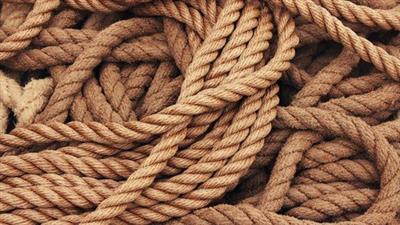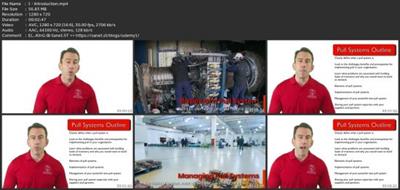Pull Systems

Published 3/2024
MP4 | Video: h264, 1280x720 | Audio: AAC, 44.1 KHz
Language: English | Size: 6.54 GB | Duration: 3h 50m
Pulling Demand! Rather Than Pushing It!
What you'll learn
The key elements and concepts of a pull system. Including one piece flow and kanbans.
The foundational steps involved in implementing a pull system with easy to learn mnemonics that outline methodologies including PULLIT, FLOW and ONEPIECE.
Critical techniques like line balancing and the leveling of production.
How you can manage a pull system effectively.
Basics of a kanban system needed to help manage a pull system including internal kanbans, move kanbans and external kanbans.
One-piece or Single piece flow that will help you reach true Pull.
How you can link together outside organizations to your pull system.
Requirements
There are no requirements or prerequisites for this course. All may enroll.
Description
The Pull Systems Course by Lean Strategies International LLC presents the details of just what a pull system is and why they are so powerful. We walk you through the foundational pieces of information that will prepare you to enhance as well as drastically improve the flow of materials in both your supply chain and in your operations. In a pull system all processes are driven by customer demand. This allows an organization to minimize the need for forecasting and operate without schedule while reducing costs, waste and all the delays that occur in a push system. In this course you will learn:The key elements and concepts of a pull system. Including one piece flow and kanbans.The foundational steps involved in implementing a pull system with easy to learn mnemonics that outline methodologies including PULLIT, FLOW and ONEPIECE.Critical techniques like line balancing and the leveling of production.How you can manage a pull system effectively.Basics of a kanban system needed to help manage a pull system including internal kanbans, move kanbans and external kanbans.One-piece or Single piece flow that will help you reach true Pull.How you can link together outside organizations to your pull system.
Overview
Section 1: Introduction
Lecture 1 Introduction
Lecture 2 What is a Pull System?
Lecture 3 What is a Push System?
Lecture 4 Pull Systems vs. Push Systems
Section 2: Some Challenges of Producing Items and Information
Lecture 5 Challenges of Producing Materials and Information
Lecture 6 The Dangers of Forecasting Demand
Lecture 7 Managing Product Variety
Lecture 8 Reducing Costs associated with Production
Lecture 9 Excessive Waste in Production
Lecture 10 When to Consider not Pulling
Lecture 11 Getting Started with Pull Systems Introduction
Lecture 12 Establishing commitment to continuous improvement and focus on waste reduction
Lecture 13 Implementing regular team based improvement events
Lecture 14 Measuring your improvements
Lecture 15 Creating a visual organization and 5S
Lecture 16 Quick Changeovers
Lecture 17 Training Multi skilled People
Lecture 18 Cellular Designs
Section 3: Why Choose a Pull System?
Lecture 19 Understanding Material/Information Flow
Lecture 20 What happens if you improve only Information Flow?
Section 4: Getting Ready to Make the Switch From Push to Pull.
Lecture 21 Lead Time Considerations in a Push System
Lecture 22 The Impact of Lean on Lead Time
Lecture 23 The problem with inventory and overproduction
Lecture 24 Why does inventory accumulate in organizations?
Lecture 25 Why is inventory dangerous?
Lecture 26 Push to Pull
Lecture 27 Better understand flow
Lecture 28 Where are your customers?
Lecture 29 Breaking down how flow occurs
Lecture 30 What is Flow?
Lecture 31 Value Streams and Flow
Lecture 32 Requirements to keep things FLOWING
Lecture 33 Overview of Leveling
Section 5: Implementing a Pull System.
Lecture 34 Sequence of Implementation
Lecture 35 Creating an infrastructure to Implement Pull
Lecture 36 Roles for your Infrastructure
Lecture 37 A place for lean
Lecture 38 Improvement Time
Lecture 39 Improvement Meetings and Huddles
Lecture 40 List of Improvement Possibilities
Lecture 41 Where will you find most of your improvements?
Lecture 42 The Kaizen Approach to Improvements
Section 6: 6 Steps to Implement Pull
Lecture 43 Basic Steps to Implement Pull Introduction
Lecture 44 Preparing to Implement Pull
Lecture 45 Understand the Current Process
Lecture 46 Layout equipment in sequence
Lecture 47 Lock in cellular manufacturing
Lecture 48 Work Sequence
Lecture 49 Cell Shapes
Lecture 50 Point of Use Placement within Cells
Lecture 51 Implement Kanban
Lecture 52 Transition to single piece flow
Lecture 53 Cell Shapes
Lecture 54 Point of Use Placement within Cells
Lecture 55 Implement Kanban
Lecture 56 Transition to Single Piece Flow
Lecture 57 Leveling Production (Heijunka)
Lecture 58 Shish-Kabob Production
Lecture 59 Takt Time
Lecture 60 How can a Load Leveling Box Help Level Production?
Lecture 61 Balancing your Lines
Lecture 62 Cross Training
Lecture 63 Quality in a Pull System
Lecture 64 What's the difference between an error and a defect?
Section 7: How do you Manage your Pull System?
Lecture 65 Pull System Management Intro
Lecture 66 Guidelines to follow when using Kanban
Lecture 67 How does Feedback work in a Kanban System?
Lecture 68 What is the purpose of kanban?
Lecture 69 Different Types of Kanbans: Move Kanban
Lecture 70 Different Types of Kanbans: Production Kanbans
Lecture 71 Different Purposes of Kanban
Lecture 72 Transitioning to One Piece Flow Intro
Lecture 73 Initiating One-Piece Flow
Lecture 74 Establishing an Environment for Flow
Lecture 75 ONEPIECE - Steps to implement one piece flow
Section 8: Sharing your Pull System with Suppliers.
Lecture 76 Extending pull to your suppliers Intro
Lecture 77 Improving Delivery Transportation
Lecture 78 Improve how your suppliers load their delivery vehicles
Lecture 79 Increase the number of deliveries per day
Lecture 80 Find the most efficient route of delivery
Lecture 81 What to Do Internally to Help Extend Pull?
Lecture 82 Introduction to Supplier Kanbans
Lecture 83 Use Buffer Inventory to Help Suppliers Transition
Lecture 84 Buffer Inventory
Section 9: Wrapping Up
Lecture 85 Wrapping Up
Lecture 86 Graduation
People looking to learn about Pull Systems and Building to Demand.,Continuous Improvement Practitioners,Lean Enthusiasts,Engineers,Production Control Personnel,Production Planning Personnel,Operations Employees,Business Owners Looking to Improve Their Organization,Toyota Production System Enthusiasts,Quality Personnel,Supply Chain Professionals,Inventory and Inventory Management Professionals
Screenshots

rapidgator.net:
https://rapidgator.net/file/4f20abc73fd810fe8f5a3667c1445c2f/clnlb.Pull.Systems.part1.rar.html https://rapidgator.net/file/1f6cde2a3cbc5bfe066e6bb441cd0a2e/clnlb.Pull.Systems.part2.rar.html https://rapidgator.net/file/e384d42261a488036df13e5852acd281/clnlb.Pull.Systems.part3.rar.html https://rapidgator.net/file/8a0be2417c0b68cc616b1929b73eda5a/clnlb.Pull.Systems.part4.rar.html https://rapidgator.net/file/48cd12b9329cc95b957d9f98590bf9b3/clnlb.Pull.Systems.part5.rar.html https://rapidgator.net/file/696376e9179a981debc6e5ad65aebaf8/clnlb.Pull.Systems.part6.rar.html https://rapidgator.net/file/756f0fd609cc9784691964472360a027/clnlb.Pull.Systems.part7.rar.html
nitroflare.com:
https://nitroflare.com/view/45332B66EEEAFE2/clnlb.Pull.Systems.part1.rar https://nitroflare.com/view/51D5D2B83EF1AF4/clnlb.Pull.Systems.part2.rar https://nitroflare.com/view/52099B4D843C8ED/clnlb.Pull.Systems.part3.rar https://nitroflare.com/view/8F829F33970B9D9/clnlb.Pull.Systems.part4.rar https://nitroflare.com/view/5E0571DBBE49B95/clnlb.Pull.Systems.part5.rar https://nitroflare.com/view/9C5A01DEE58FB07/clnlb.Pull.Systems.part6.rar https://nitroflare.com/view/0855C241C2A4739/clnlb.Pull.Systems.part7.rar